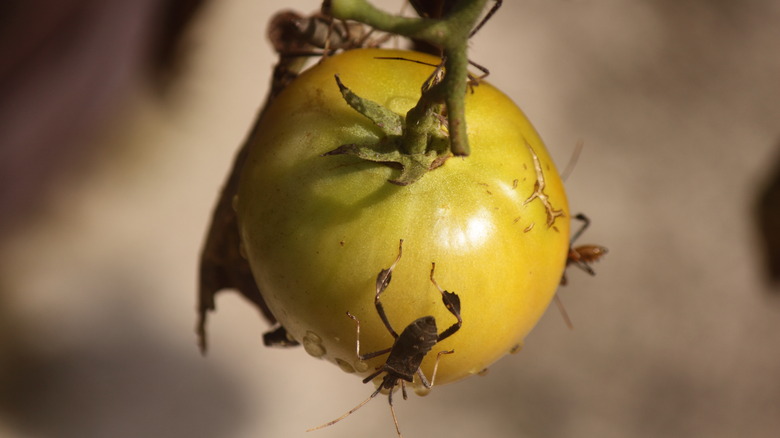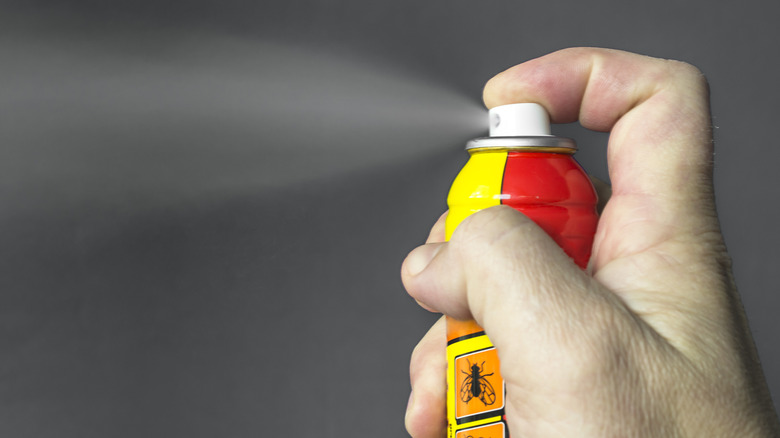Think Twice Before Using This Common Product To Get Rid Of Stink Bugs
Stink bugs, those unmistakable shield-shaped insects, have earned their reputation as unpleasant houseguests that usually turn up when the temperature starts to drop. These pests are not just a nuisance because of their foul odor when disturbed; they can wreak havoc on garden plants and agricultural crops. With stink bugs around, you may already be desperate for a solution. But before you reach for a chemical insecticide, understanding why it may not be the best solution to get rid of stink bugs is crucial.
As voracious plant feeders, stink bugs have a penchant for puncturing fruits, vegetables, and ornamental plants with their needle-like mouthparts, causing unsightly blemishes and rendering produce inedible. This destructive feeding behavior not only affects your garden but can also have significant economic implications when they invade farmlands. Furthermore, stink bugs are known to gather in large numbers, making infestations particularly troublesome. Once inside your home, they seek shelter in cracks and crevices, making it challenging to control their population. While their notorious odor, released as a defense mechanism when threatened or crushed, is reason enough to deter them, it's their potential for widespread crop damage that makes stink bugs a real headache for homeowners and farmers alike.
Despite these compelling reasons to eliminate stink bugs from your living space, using chemical insecticides may not be the most effective or environmentally responsible approach. So, let's delve into the specific disadvantages of using chemical insecticides to combat stink bugs and explore more suitable alternatives for stink bug control.
Disadvantages of using chemical insecticides
So, why aren't chemical insecticides the best alternative to get rid of stink bugs? First, stink bugs are equipped with a natural defense mechanism that sets them apart — a tough, waxy exoskeleton. This armor acts as a formidable barrier, making it challenging for chemical insecticides to penetrate and exterminate them effectively. In many cases, these bugs can endure chemical exposure without suffering fatal consequences.
Another con to using chemical insecticides is that when these are applied indoors to combat stink bugs, they often leave behind unwanted residues. These residues can be harmful to humans and pets, and when combined with stink bug secretions, they create a potent and unpleasant odor within your home. This not only fails to solve the problem but adds another layer of discomfort. Besides, the smell of dead stink bugs in your home may attract other insects.
It's also crucial to consider the broader consequences of using chemical insecticides. These chemicals can harm beneficial insects, disrupt local ecosystems, and contribute to environmental pollution. The long-term environmental effects of chemical pesticide use raise concerns about its sustainability. Moreover, just like many other pests, stink bugs can develop a resistance to chemical insecticides over time. This resistance can make these chemicals even less effective in the long run, ultimately leading to the need for more potent and potentially more harmful solutions.
Better solutions for effective stink bug control
To effectively rid your home of stink bugs and avoid the drawbacks of chemical insecticides, consider these alternative solutions. Stink bug-proof your home by sealing entry points, as these pests typically enter through cracks and gaps in windows, doors, and walls. You can also install physical barriers, such as screens on doors and windows to keep stink bugs out while allowing fresh air in.
A simple and non-toxic approach to stink bug control is to use a vacuum cleaner to remove them from your home. However, make sure not to squish them to avoid releasing their foul odor. Empty the vacuum bag or canister promptly and keep the remnants sealed in a plastic bag. You can also use natural pest deterrents you may already have in your pantry. Stink bugs dislike the scent of certain herbs and spices, such as mint, bay leaf, and garlic, so placing these around your home can discourage them from launching an invasion. If the stink bug infestation in your home is already severe, consider hiring a pest control professional who can employ targeted and environmentally friendly methods to eliminate stink bugs.
By opting for these alternatives and adopting preventive measures, you can effectively manage stink bug infestations without resorting to chemical insecticides, ensuring a pest-free and eco-friendly home environment.


